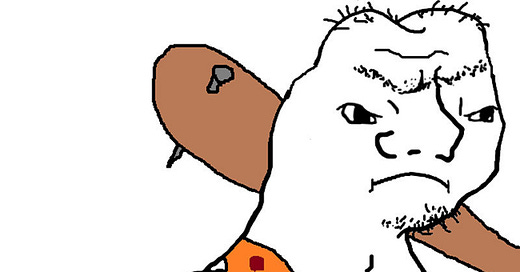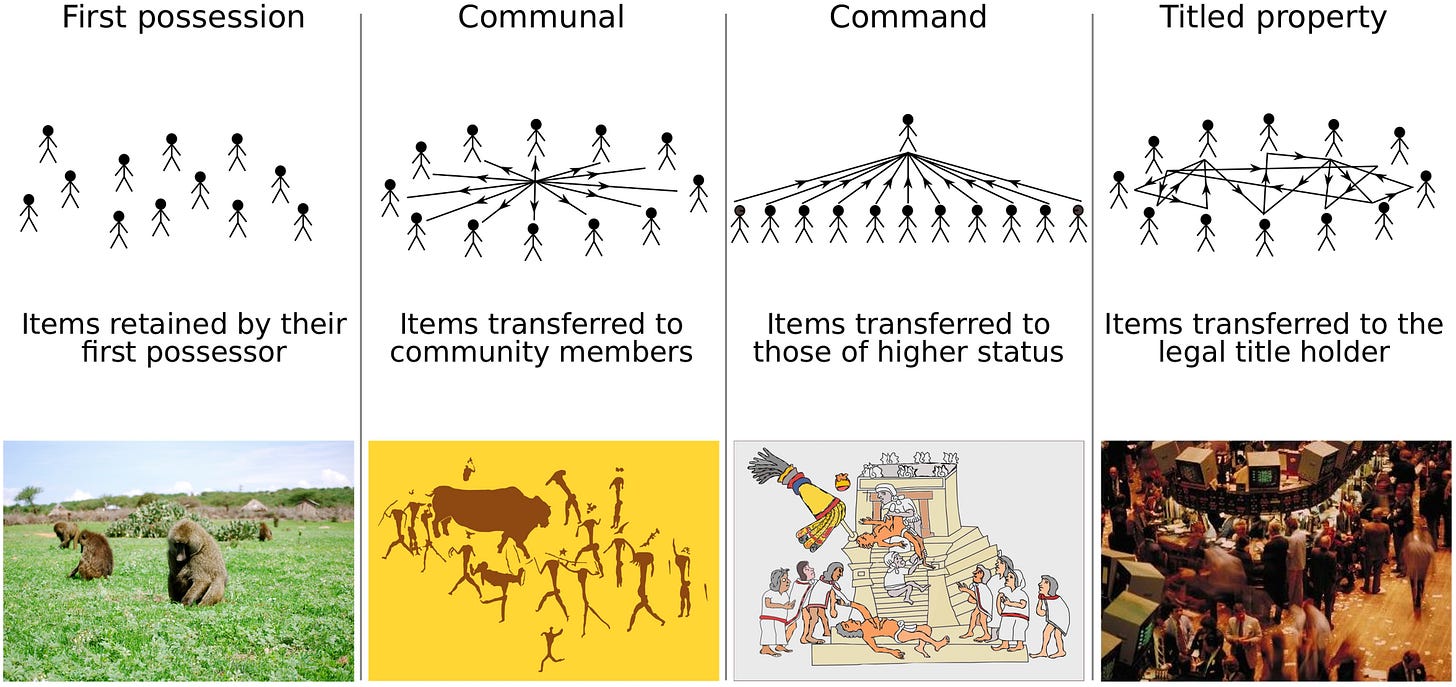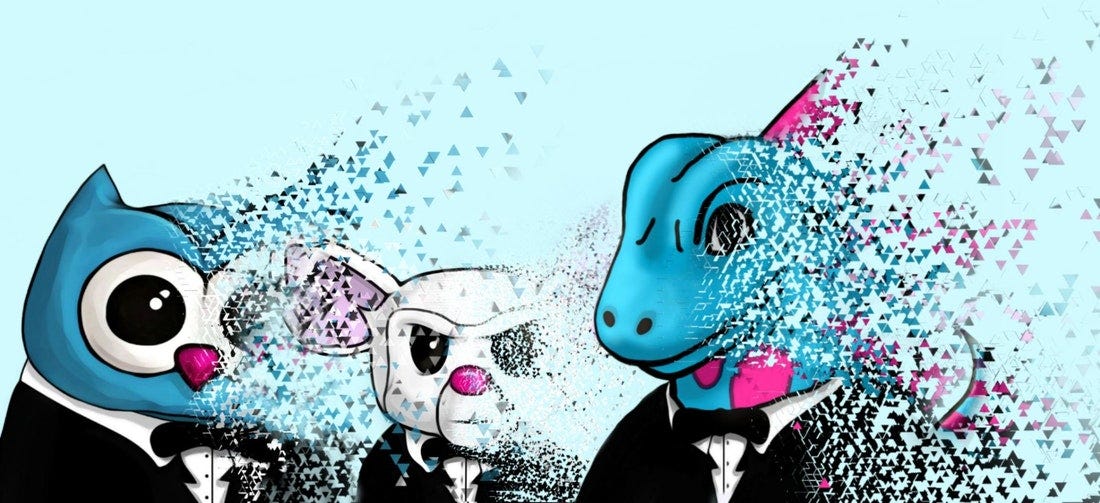Welcome Avatar!
Today we want to dive deep on the concept of ownership.
What do you own, really? Is ownership personal, or is it group consensus? Who gets to decide what is yours? What happens when there are conflicts?
All these important questions will be answered today on DeFi Education (stay to the end for the point of it all).
We have an international reader base, but most of you are reading from the Western world. That means most of you, unless you’ve had the displeasure of being caught up in property disputes, probably take ownership for granted. You own the computer or phone you’re reading this from, but you don’t really think about what allows you to say it’s truly “yours.”
If you’ve read any of our past work on governance tokens you’ll know we say this repeatedly: ownership is a *legal* right. While you might say it’s black and white that you own something, the law has to “agree.”
Of course, ownership wasn’t always this way. We wouldn’t be surprised if our ancestors were fighting over which rock belongs to which caveman at one point. At the very least, they would have had a distinct sense of “mine and thine” when it came to food. Property laws make it so that people stop clubbing each other over petty squabbles.
Given the nomadic nature of humanity during ancient times, we’d imagine there wasn’t much practicality to “owning” a bunch of “stuff.”
It wasn’t until humans began to settle that ownership took off. Being able to get your basic needs met through agriculture meant that you could stay in one place. Staying in one place meant you could keep your possessions. And once upon a time, possessing the item meant you owned it.
Perhaps eventually you built a little hut that held your belongings. All your neighbors knew you lived in that hut and everything inside the hut were your possessions.
If someone came by while you were out one day, took a nap and decided they didn’t want to leave, your neighbors would help you kick them out. They’d expect that if someone tried to squat on their hut one day, you’d return the favor.
Possession, then, is only one step of the way to ownership. To secure your possessions, you need group consensus.
That’s right. You alone do not decide that you “own” something. It’s actually everyone else opting in to your ownership of your possessions (and by extension, their ownership of their own possessions) that allows you to secure your belongings.
At scale, societies must establish a unified group consensus that dictates this “way of life.” Things you can do and things you can’t do without facing consequences, enforced with the threat of violence and/or imprisonment. The social, moral and legal frameworks of society combined allow for “ownership.” Opting in to these systems also requires opting in to the consequences. The laws of the land, so to speak.
Over the course of history the concept of ownership has evolved based on the prevailing societies and cultures.
Structures for ownership range from “finders keepers” to being centrally concentrated among rulers. Kings would rule over lands and allow their vassals to have use of it in exchange for their loyal service.
Today, individuals can own property, financial assets, companies, and more. These individuals can employ other individuals and compensate them for their labor. In some instances, employees may also receive a small portion of ownership.
The assets you own are registered with the government whose job it is to protect and honor your property rights. You pay them a big chunk of your income every year so they can provide you with these protections (among other things).
Here’s the catch: to continue to receive these protections, you need to stay in the good graces of your government.
If you don’t pay your property taxes, guess what? The government can seize your property. If your property has been deemed to be associated with criminal activity, the government can seize it. If the government wants to use the land of your property for “public use”, they can seize it.
You get the point. You “own” your property, but with an asterisk.
Now some of you might be thinking “just pay your taxes and don’t commit a crime it’s not hard.” That train of thought probably works out fine for most people, most of the time. But what about when your livelihood is affected and you exercise your right to protest? The Canadian truckers protesting vaccine mandates and anyone tied to them had their bank accounts frozen.
What about when there isn’t enough money to go around, despite you having done nothing wrong? In 2013, Cyprus levied a tax of 6.75% on insured deposits (<€100,000) and 9.9% from uninsured amounts above €100,000 on savers to bailout the banking system.
In times of severe economic, social, or political upheaval, who knows how the law will be used.
Ownership, then, is an opt-in and cooperation with the applicable political system. You are not just buying a house, you are buying into the stability of the political environment and economy of the nation. If you own a house you’re opting into the idea that your property rights are backed by the nation it’s based in. You expect that the nation will, at minimum, keep the riff raff from squatting on your home. You hope that if you fill out all your forms and pay all the appropriate fees, your assets are in fact yours.
Crypto provides an alternative. Crypto changes the vehicle of ownership from being primarily legal to being primarily technology. Crypto ownership allows for ownership by possession of digital goods. And if you’ve paid attention at all over the last 10+ years, today’s “land grab” is digital, not physical.
The digital age came with a new host of evolutions to the concept of ownership. Ebooks, music, and videos can be bought, but they can also be licensed and mass consumed. For example, iTunes meant that you would buy a song, but you only owned it for limited purposes. The song was “yours” to listen to, but the rights were owned by the artist / their record label. Today, you have Spotify and Apple Music which have catalogs of millions of songs they license and provide to you for unlimited consumption.
The crypto age comes with further evolution. Cryptocurrencies rely on permanent, irrefutable records of ownership using a public ledger. Having a private key means the crypto is in your possession. Being the exclusive holder of the private key means the crypto is exclusively in your possession. If you memorize your 12 words and don’t tell anyone, it’s as good as law-enforced ownership. In fact, it’s even better - no one can take your assets from you. Not even the government.
You don’t have to be a “doomer” to appreciate the importance of having a portion of your assets held in the most seizure-resistant asset on the planet. You don’t have to be a “criminal” to understand that you have to look out for yourself.
We’re being careful with our words here - this alone is not “ownership” in the traditional sense. It’s possession. Anyone with the private key can transact with that wallet’s crypto. Due to on-chain pseudonymity, your crypto could be lost forever if the private key ends up in the wrong hands. We’re not ignoring the tradeoffs - you have to take full responsibility of your assets. With proper key management, crypto is the strongest form of ownership we have on the planet today.
Think that’s a bold statement? For fun, we challenge you to make a good case for a stronger form of ownership than crypto (let us know in the comments!).
Concluding Thoughts
Ownership is a complex subject and the concept of ownership is not static. You can expect that people will always want to keep what’s theirs and look for new ways to ensure their wealth is protected.
In times of peace, in a country with a reasonably healthy economy and a government that doesn’t overstep their boundaries, you can safely assume what you own is yours. If/when the state of affairs turns sour, we come face to face with what ownership truly represents.
Crypto is an alternative vehicle of ownership that doesn’t require a centralized party to decide on the owner. Instead, it’s almost as if we have traveled back in time to ancient civilizations, when you and your neighbors all agreed everyone’s possessions were their own. The only difference is that now, your neighbors are globally distributed cartoon frogs (alright fine, and corporate entities) that help secure the networks that “hold” your assets and ownership data.
Until next time, anon..
P.S. We’ve got a deep dive dropping soon for paid subscribers 👇
Disclaimer: None of this is to be deemed legal or financial advice of any kind. These are opinions from an anonymous group of cartoon animals with Wall Street and Software backgrounds.
We now have a full course on crypto that will get you up to speed (Click Here)
Security: Our official views on how to store Crypto correctly (Click Here)






Excellent write up DeFi Ed
This was stimulating.
Couldnt help but be a little angry about the legacy system, as its currently letting me down hard, but hey... thats why we're in crypto.